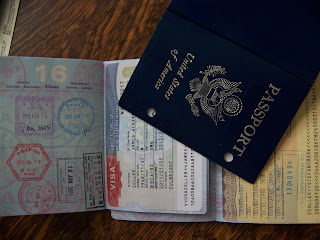Thursday, August 25, 2011
Busan Journal, China Adventure, Part I
Getting There
If memory serves, we first dreamed of travel to China during the 1970s, shortly after Nixon greeted Mao in Beijing.
At the time, our family was very young, three under five, with another child still to come, so we did not see how China would ever be possible.
A lot has happened since then.
When our stay in Korea began to materialize, China became a possibility. As we planned for our February 2011 departure for Korea, we had a rough notion we could use our base in Korea to visit other places in Asia. Both China and Japan seemed within reach. Vietnam was a more distant possibility.
If we could visit Japan, we would want to see Naho, one of our first home stay daughters. If we wanted to see China it would need to be in late May or June, after our Chinese home stay kids returned home from their U.S. colleges. Largely because of tropical heat, which we are constitutionally unsuited to, the possibility of Vietnam would remain "remote."
Japan does not require a tourist visa, but China does. Back in January, without precise travel dates for our visa application, we were advised to apply once we reached Korea. There is a Chinese consulate in Busan, we were told; just apply when you know more.
Good idea. No problem.
We had originally planned to visit Japan during the university exam break in mid-April. Unfortunately, as everyone knows, Japan suffered an earth quake at the end of March that caused both a devastating tsunami and a nuclear reactor "meltdown."
Naho, who lives in Tokyo, said we should not come. But once life had normalized, our mid-term window had passed.
We continued to hold out hope for Japan even as we made plans for China. After settling travel dates with Edward, who had lived with us the year before, I hunted down the Chinese Consulate in Busan only to find myself lost in a hot, crowded, windowless, square room filled with signs in Chinese and Korean. Not an English word in the place that I could see.
It was austere and unfriendly to the point of being forbidding. Chest-high counters along three of the walls were crowded with people filling out applications. Dozen of people were queued up to windows along the fourth wall, tiny openings covered almost completely with glass.
It would be fair to say, I felt a bit conspicuous.
In time, a young woman in uniform came out to me. She asked what I wanted, which surprised me as this was the visa application office. I told her. She looked at my passport and my applications, then informed me that I needed a Korean Alien Registration Number. No ARN, no visa. No visa, no China.
I had no ARN, as I had been told it was not necessary.
What follows is the kind of bureaucratic run-around that we have come to call a "catch 22" after the ever changing regulations that kept servicemen from leaving the combat zone in Joseph Heller's famous war novel.
After the Chinese Consulate, we visited Korean Immigration to apply for an ARN. After several hours in the small, crowded waiting room, we met Mr. Yoyo, who was both very serious and very helpful. Not fast, but helpful. His English was OK, which we thought was just fine as we had no Korean beyond "anyounghaseo" and "kamsamnida." Hello and thank you.
Mr. Yoyo spent a great deal of time examining my Fulbright ID, our passports, our applications, and his computer screen. From time to time he would ask a question for information that I had already written on the application; then he would get up and walk to use a computer on the other side of the room.
Several times he looked directly at us and said, "Mr. Zoller, welcome to my country."
I felt it was a nice gesture, welcome, as immigration offices have to be the least friendly places on earth, apart from war zones and prisons. At any rate, I felt I was getting mixed messages. The room said "abandon hope" -- Mr. Yoyo was saying "welcome."
The short version of this story is that the three week wait for the ARN became seven due to a change in regulations while our passports we "in the system" somewhere in Busan. I found this out when I went down on the appropriate date to pick up the Alien Registration cards and our passports. Rule changes would delay our departure for China until June 20, way too late for us due to my teaching obligations and our departure date for return to the States.
It also meant we could not squeeze in a quick trip to Japan as we had no passports.
In the mean time, we learned that if we flew to Hong Kong, which has special status in the Chinese governance structure, we could obtain an expedited visa for China within 24 hours.So we did not need the ARN after all, just our passports, if I could only get them out of the system.
When I texted Mr. Yoyo in early June to see if I could move the process along or simply retrieve our passports, I received this text in return: "Both AR cards and passports are here. You can pick them up."
He did not say how long they had been sitting in the Immigration office. Kamsamnida
We did not go back to the Chinese Consulate. Instead I booked a flight to Hong Kong for the earliest date I was free. Then I wrote Edward to tell him when we would arrive and how long we thought we could stay.
From that point on, come what may, we were heading for China. After a long delay the wheels were in motion, the dream would become reality. We would have to pinch ourselves later.
Subscribe to:
Post Comments (Atom)






No comments:
Post a Comment